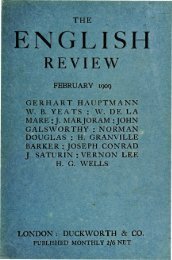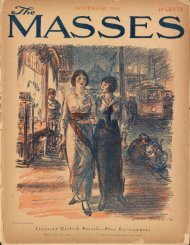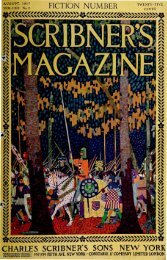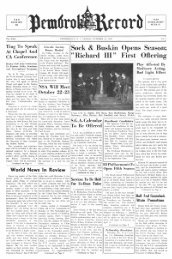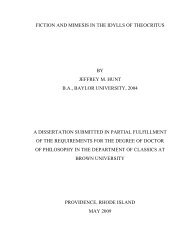View PDF - Brown University Library
View PDF - Brown University Library
View PDF - Brown University Library
- No tags were found...
You also want an ePaper? Increase the reach of your titles
YUMPU automatically turns print PDFs into web optimized ePapers that Google loves.
"Ten Thousand" came to a river "ahundred feet broad, stocked with tamefish which the Syrians regard as gods andwill not suffer to be injured—and so, too,the pigeons of the place." (I was toldthat there are still "innumerable carp"in that vicinity, to this day held sacred.)The villages thereabout in the time ofthe Anabasis belonged to Parysatis, themother of Cyrus, "as part of her girdlemoney." And the villages thereabout today,with their conical huts, such as Isaw nowhere else, look at a distance likethe ornaments on a girdle, though ofcourse Xenophon used the illustrationwith another import.From this place I travelled one grayFebruary morning to the Euphrates, afew more parasangs by the Bagdad train,slow as it was, than Cyrus's men marchedthence (enteuthen exelaunei) in "fivestages." But instead of taking Cyrus'sshort course to the river (and that ofAlexander the Great), the road, to avoidthe desert beyond, since it could not followthe Euphrates, turns northward andcrosses the river some fifty miles higherup than Cyrus's famous fording (where"no man was wetted above the chest"—the river "manifestly retiring before theface of Cyrus like a courtier bowing tothis future king"). The iron bridge ofthe iron path asks no obeisance. It isindifferent to the floods of this turbidstream, and permanently holds the fordswhere Nebuchadnezzar stopped the advanceof Pharaoh Necho.But Nebuchadnezzar and Necho arenow names only. East Indians, picturesque,dignified, and detached, even inkhaki, guard both sides of the Euphrates.Turks, who have exchanged their flowingrobes for shabby European workingclothes, drive the wheezy engines, madeThe Berlin to Bagdad Line 69in Magdeburg or Essen, which crawlacross the bridge and back two or threetimes a week, leaking at every pore. Andyoung, lithe, quiet English officers, whoknow both the West and the East, try tokeep things in order until the Peace Congressaround a remote table decides whatis to be done with the territory for whichmankind has fought off and on for aboutsix thousand years.What with the steel bridge, the watertank,and the "round house," the Bagdadstation at Jerablus (or Carchemish, ifyou prefer its most ancient-known name,)might, except for the figure of the EastIndian soldier against the flat landscape,be a Chicago and Rock Island stationalong some low-banked stretch of theIllinois River. I well remember how thatMiddle Western stream seemed in myboyhood to run out of or through Paradise.It required some effort of the imagination,however, as well as faith in theinfallibility of the Scriptures, to think ofthe Euphrates as having any memory ofthe Garden of Eden. (Yet I know thatmany an Appalachian or Rocky MountainAmerican has to make the same efforttouching the Illinois River.)Certain it is, at any rate, that Abrahamlived in this region. Indeed, the city towardwhich I was journeying called itselfhis birthplace, though its name was Urfaand not Ur (and known as Edessa, inthe Middle Ages, the farthest city heldby the Crusaders under the lordship ofBaldwin). Whatever archaeological doubtthere may be as to Abraham's havingbeen born there, Haran, where he livedfor many years with his father Terah,was not farther away from where I wasthan Poughkeepsie is from Albany. So, Iwas in the country that was Abraham'shome, before his migration, at the age ofseventy-five and in the year 1921 B. C.(according to Ussher), into the Land ofPromise. By a singular and unplannedcoincidence it was Abraham Lincoln'sbirthday, the 12 th of February, in theyear 1919 A. D.I had intended to walk about thirtymiles beyond the station Arab-Punar atwhich the train stopped, there being notroops as yet to guard the stations farthereast. (The track is laid, however, toand perhaps beyond Nisibin.) But Iwas advised that my going to give theproposed relief (in the city where overtwenty years ago a thousand Armenianswho had taken refuge in a church "weresuffocated by the smoke of burning carpetsand mats previously soaked in petroleum,"and where new sufferings werebeing inflicted) would probably invite thefurther persecution of those I wished tohelp, and so, sending by stealth to them



